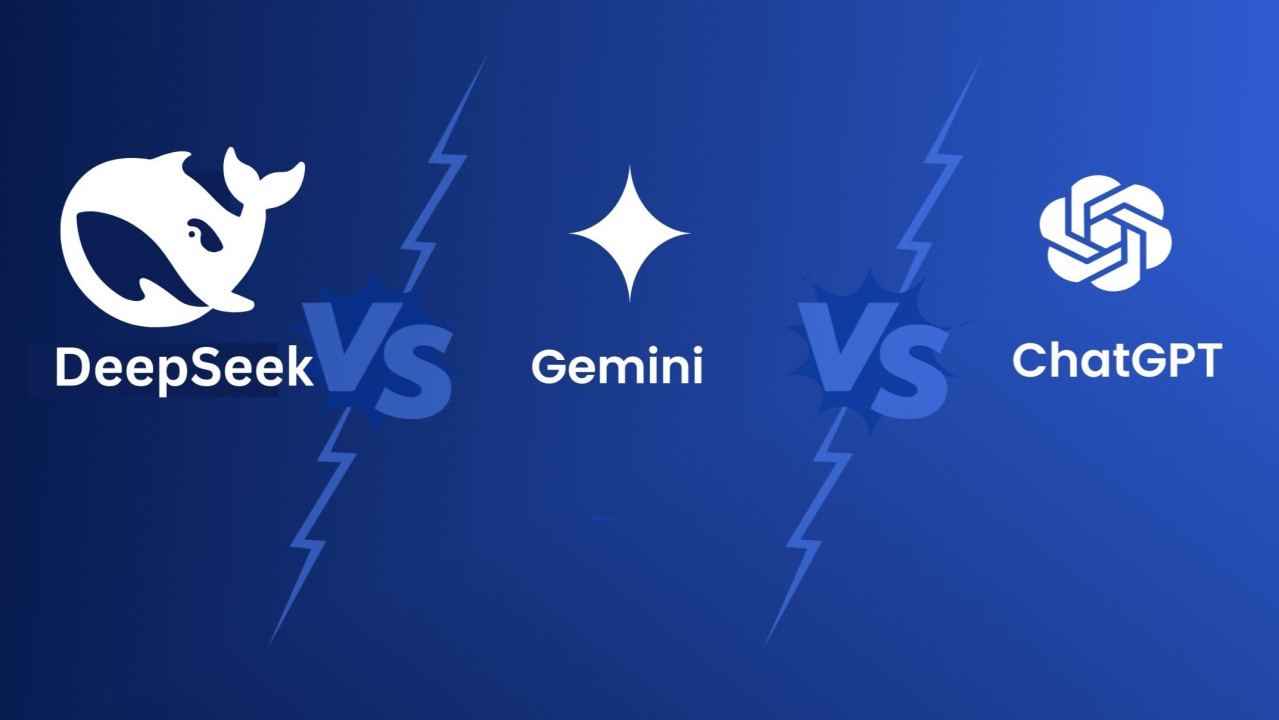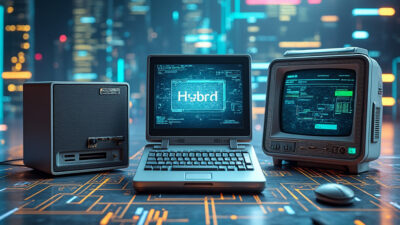ChatGPT vs Deepseek vs Gemini The Ultimate AI Chatbot Showdown
In the rapidly evolving world of artificial intelligence, ChatGPT, Deepseek, and Gemini stand out as leading chatbots, each with unique strengths and innovations. This article delves into their development, features, and how they compare in the AI landscape. Whether you’re a tech enthusiast or a professional, understanding these platforms can help you navigate the future of AI.
The Rise of AI Chatbots
The rise of AI chatbots marks a pivotal shift in how humans interact with technology, driven by decades of research in natural language processing (NLP) and machine learning. The emergence of ChatGPT, Deepseek, and Gemini reflects the culmination of efforts by leading tech organizations—OpenAI, DeepSeek, and Google—each pushing the boundaries of AI in unique ways.
The foundation of modern chatbots traces back to early rule-based systems like ELIZA in the 1960s, but the real breakthrough came with transformer architectures, introduced in 2017. OpenAI capitalized on this with its GPT series, culminating in ChatGPT, which leveraged massive datasets and reinforcement learning from human feedback (RLHF) to achieve unprecedented conversational fluency. Meanwhile, Deepseek, developed by the Chinese firm DeepSeek, emerged as a strong contender, optimizing for efficiency and multilingual capabilities, catering to a global audience. Google’s Gemini, built on its proprietary Pathways architecture, integrated multimodal understanding from the start, enabling seamless interactions across text, images, and code.
Several factors fueled this AI arms race:
- Cloud computing made large-scale model training feasible.
- Open-source contributions accelerated innovation, with frameworks like TensorFlow and PyTorch lowering entry barriers.
- Market demand for intelligent assistants in customer service, education, and content creation drove rapid commercialization.
OpenAI’s focus on democratizing AI through iterative public releases set a precedent, while Deepseek and Google prioritized specialized use cases—Deepseek in cost-effective deployment and Gemini in unifying multiple AI modalities. This competitive landscape ensures continuous evolution, with each player refining their models to balance performance, accessibility, and ethical considerations. The next chapter will delve deeper into ChatGPT’s architecture and its transformative role in shaping the AI industry.
Understanding ChatGPT
ChatGPT, developed by OpenAI, represents a groundbreaking leap in conversational AI, built on the Generative Pre-trained Transformer (GPT) architecture. The model’s evolution, from GPT-3 to GPT-4 and beyond, showcases OpenAI’s commitment to refining large language models (LLMs) through massive datasets and advanced training techniques. Unlike earlier chatbots, ChatGPT leverages reinforcement learning from human feedback (RLHF), enabling it to produce more coherent, context-aware, and nuanced responses.
One of ChatGPT’s defining features is its freemium model, offering free access to GPT-3.5 while reserving GPT-4 for paying subscribers via ChatGPT Plus. This approach democratizes AI while monetizing premium capabilities like faster responses, priority access, and advanced reasoning. However, despite its strengths, ChatGPT has limitations, including occasional hallucinations (fabricated information), sensitivity to input phrasing, and restricted knowledge updates—GPT-4’s training data cuts off in 2023, limiting real-time awareness.
OpenAI’s impact on the AI industry is undeniable, setting benchmarks for natural language understanding and generation. ChatGPT has spurred innovation across sectors, from customer service automation to creative writing aids. Yet, its proprietary nature contrasts with emerging open-weight competitors, raising debates about accessibility versus control.
While ChatGPT excels in versatility and polish, its reliance on extensive computational resources and closed development raises questions about sustainability and inclusivity—a gap that challengers like Deepseek aim to address. As the AI race intensifies, ChatGPT remains a dominant force, but its future hinges on balancing performance, transparency, and adaptability in an evolving landscape.
Deepseek A New Challenger
Deepseek, developed by Hangzhou DeepSeek, has emerged as a formidable challenger in the AI chatbot arena, positioning itself as a cost-efficient and open alternative to giants like ChatGPT. Unlike OpenAI’s proprietary approach, Deepseek leverages open-weight models, allowing researchers and developers to access, modify, and build upon its architecture. This transparency fosters innovation while reducing barriers to entry, a stark contrast to the closed ecosystems of many competitors.
One of Deepseek’s standout advantages is its lower training costs, achieved through optimized algorithms and efficient resource management. By minimizing computational overhead, Deepseek delivers competitive performance without the exorbitant infrastructure expenses typical of large-scale AI models. This efficiency makes it particularly appealing for organizations with limited budgets but high ambitions in AI deployment.
Deepseek’s impact on the industry is twofold. First, its open-weight philosophy challenges the dominance of proprietary models, encouraging a shift toward collaborative development. Second, its cost-effective training methods could democratize AI, enabling smaller players to compete with tech giants. However, its open nature also raises questions about misuse, as unrestricted access may lead to unethical applications if not properly governed.
While still a newcomer compared to ChatGPT, Deepseek’s rapid advancements suggest it could reshape the competitive landscape. Its ability to balance performance, affordability, and accessibility makes it a compelling option for developers and enterprises alike. As the AI race intensifies, Deepseek’s innovations may force established players to reconsider their strategies—whether by adopting similar open models or doubling down on proprietary advantages. The battle for AI supremacy is far from over, and Deepseek is proving to be a disruptive force worth watching.
Gemini Google’s Answer to AI
Gemini, Google’s ambitious answer to the AI chatbot race, represents a significant leap from its predecessor, Bard. Developed by Google DeepMind, Gemini was designed to outperform competitors like OpenAI’s ChatGPT and Deepseek by leveraging Google’s vast infrastructure and expertise in machine learning. Unlike Bard, which relied on a fine-tuned version of LaMDA, Gemini is built on a more advanced multimodal architecture, enabling it to process not just text but also images, audio, and video seamlessly. This positions Gemini as a versatile tool for both consumers and enterprises, aligning with Google’s broader AI strategy to integrate AI across its ecosystem, from Search to Workspace.
Gemini’s rollout was met with both excitement and skepticism. Initial demos showcased impressive capabilities, but real-world performance revealed inconsistencies, leading to criticism about overhyped benchmarks. Controversies also arose around Gemini’s handling of sensitive topics, with some users accusing it of excessive political correctness—a recurring issue for Google’s AI projects. Despite these challenges, Gemini’s integration into Google’s products, like the AI-powered Search Generative Experience (SGE), underscores its strategic importance. Google aims to make Gemini the backbone of its AI services, competing directly with OpenAI’s GPT-4 and Deepseek’s cost-efficient models.
The technology behind Gemini includes a combination of transformer-based models and novel training techniques, such as reinforcement learning from human feedback (RLHF) and synthetic data generation. Its multimodal capabilities are powered by Google’s proprietary TPUv4 chips, enabling faster and more efficient processing than traditional GPU clusters. As the AI landscape evolves, Gemini’s success will hinge on its ability to balance innovation with reliability, carving out a niche in a market dominated by established players and agile newcomers like Deepseek.
Technology Behind the Chatbots
ChatGPT vs Deepseek vs Gemini
Under the hood, ChatGPT, Deepseek, and Gemini rely on distinct architectures and training methodologies, shaping their performance and interaction styles. ChatGPT, developed by OpenAI, is powered by the GPT (Generative Pre-trained Transformer) family, with GPT-4 Turbo being its latest iteration. It employs a transformer-based architecture, trained on vast datasets using supervised and reinforcement learning from human feedback (RLHF). This fine-tuning ensures nuanced responses but demands significant computational resources.
Deepseek, a rising competitor, leverages a proprietary LLM optimized for efficiency and cost-effectiveness. Unlike ChatGPT, Deepseek emphasizes lightweight model architectures, reducing inference costs while maintaining competitive performance. Its training incorporates a mix of open-source and proprietary datasets, with a focus on domain-specific optimizations. This approach allows Deepseek to offer high-quality responses at a lower operational cost, appealing to budget-conscious users.
Gemini, Google’s flagship AI, builds on the Pathways architecture, enabling multimodal reasoning across text, images, and audio. Unlike ChatGPT’s reliance on pure transformer models, Gemini integrates a mixture-of-experts (MoE) framework, dynamically activating only relevant model segments during inference. This reduces computational overhead while enhancing scalability. Gemini’s training leverages Google’s vast proprietary datasets, including search queries and YouTube transcripts, giving it an edge in contextual understanding.
In handling user interactions, ChatGPT excels in creative tasks but can struggle with real-time data. Deepseek prioritizes speed and affordability, making it ideal for high-volume queries. Gemini, deeply integrated with Google’s ecosystem, offers seamless access to real-time information and services. Each model’s design reflects its developer’s priorities—OpenAI’s focus on versatility, Deepseek’s cost efficiency, and Google’s ecosystem dominance. These technological foundations set the stage for their unique features, explored next.
Features and Capabilities
When comparing ChatGPT, Deepseek, and Gemini, their unique features and capabilities set them apart in the AI chatbot landscape. Each platform caters to different user needs, leveraging distinct strengths to deliver value.
ChatGPT, developed by OpenAI, stands out for its versatility. Built on the GPT architecture, it excels in generating human-like text across diverse applications—from creative writing and coding assistance to customer support. Its ability to handle nuanced conversations and adapt to various contexts makes it a favorite for users seeking a broad, general-purpose AI. Additionally, ChatGPT’s plugin ecosystem and API integrations allow businesses to embed its capabilities into their workflows seamlessly.
In contrast, Deepseek emphasizes cost efficiency without compromising performance. Designed to deliver high-quality responses at a lower computational cost, it appeals to developers and enterprises looking for an affordable yet powerful alternative. Deepseek’s optimized model architecture ensures faster inference times, making it ideal for scalable deployments where budget constraints are a concern. Its lean approach doesn’t sacrifice accuracy, positioning it as a pragmatic choice for resource-conscious users.
Gemini, Google’s flagship AI, shines through its deep integration with Google services. From leveraging real-time data via Google Search to seamless compatibility with Workspace apps like Docs and Sheets, Gemini enhances productivity within the Google ecosystem. Its multimodal capabilities—processing text, images, and audio—enable richer interactions, setting it apart in scenarios requiring cross-media understanding. For users entrenched in Google’s infrastructure, Gemini offers unparalleled convenience and synergy.
These distinct features translate into tangible benefits: ChatGPT’s adaptability suits dynamic use cases, Deepseek’s affordability democratizes AI access, and Gemini’s ecosystem integration streamlines workflows. The choice ultimately depends on user priorities—flexibility, cost, or seamless connectivity.
Performance and Accuracy
When it comes to performance and accuracy, ChatGPT, Deepseek, and Gemini each exhibit distinct strengths and weaknesses across different tasks. ChatGPT, powered by OpenAI’s GPT-4, excels in conversation quality, delivering nuanced and contextually rich responses. Its ability to maintain coherent, multi-turn dialogues makes it ideal for complex discussions. However, it occasionally struggles with real-time information retrieval, as its knowledge is periodically updated rather than live.
Deepseek, on the other hand, stands out for its cost efficiency without sacrificing accuracy. While it may not match ChatGPT’s conversational depth, it performs admirably in information retrieval, particularly for technical or niche queries. Its lean architecture allows for faster responses, though it can falter in creative tasks like storytelling or humor, where ChatGPT’s versatility shines.
Gemini, Google’s flagship AI, leverages the company’s vast data infrastructure to offer near-real-time accuracy in information retrieval. Its integration with Google Search ensures up-to-date answers, but this can sometimes lead to over-reliance on web results rather than synthesized insights. In creative tasks, Gemini demonstrates strong capabilities, though its outputs often feel more structured and less imaginative compared to ChatGPT.
Notably, all three models face challenges with bias and hallucination, though to varying degrees. ChatGPT occasionally generates plausible but incorrect information, while Gemini’s grounding in search data can introduce bias from source material. Deepseek, though less prone to overt hallucinations, may lack the contextual finesse of its competitors.
In summary, the choice depends on the task: ChatGPT for depth and creativity, Deepseek for efficiency and technical accuracy, and Gemini for real-time information and structured outputs. Each has trade-offs, but their evolving architectures promise ongoing improvements in performance and reliability.
User Experience and Accessibility
When it comes to user experience and accessibility, ChatGPT, Deepseek, and Gemini each offer distinct approaches tailored to different audiences. ChatGPT, developed by OpenAI, provides a polished and intuitive interface available via web, mobile apps (iOS and Android), and API integrations. Its free tier allows broad access, while the ChatGPT Plus subscription ($20/month) unlocks GPT-4 Turbo, faster responses, and priority access during peak times. The platform excels in seamless multi-device synchronization and supports voice input, enhancing accessibility for users with disabilities.
Deepseek, while less mainstream, focuses on a lightweight, no-frills experience. Its web interface is straightforward, prioritizing speed and efficiency, but lacks dedicated mobile apps. Deepseek offers a free tier with competitive capabilities, though its premium model remains unclear, possibly targeting enterprise users. The chatbot’s strength lies in its minimalistic design, appealing to users who prefer a distraction-free environment. However, its limited platform support may hinder broader adoption.
Gemini (formerly Bard), backed by Google, leverages the tech giant’s ecosystem for superior integration. Accessible via web and mobile (Android-first, with iOS support), it syncs effortlessly with Google Workspace and other services. Gemini is free, with no announced subscription yet, though Google may introduce tiered features later. Its interface is visually rich, supporting multimodal inputs (text, images, voice), but some users find it cluttered compared to ChatGPT’s cleaner layout.
In terms of accessibility, ChatGPT leads with robust screen reader compatibility and keyboard navigation. Gemini follows closely, while Deepseek lags due to its simpler but less inclusive design. Platform availability further divides them: ChatGPT and Gemini cater to casual and power users alike, while Deepseek’s niche approach may limit its reach. Each model balances cost, convenience, and usability differently, shaping their appeal across user demographics.
The Future of AI Chatbots
The rapid evolution of AI chatbots like ChatGPT, Deepseek, and Gemini suggests a future where these tools will become even more integrated into daily life and professional workflows. As advancements in natural language processing (NLP), multimodal capabilities, and personalization accelerate, each platform is poised to carve out distinct niches while pushing the boundaries of what AI can achieve.
ChatGPT, backed by OpenAI, is likely to deepen its focus on enterprise applications, refining its API for developers and expanding its plugin ecosystem. Future iterations may prioritize real-time collaboration features, allowing seamless integration with tools like Slack or Microsoft 365. OpenAI’s emphasis on safety and alignment could also lead to more sophisticated moderation tools, making ChatGPT a preferred choice for regulated industries.
Deepseek, with its strong open-source roots, might continue to appeal to developers and researchers by offering greater transparency and customization. Expect advancements in fine-tuning capabilities, enabling users to train highly specialized models for niche tasks. Deepseek could also leverage its efficiency to dominate in edge computing, bringing powerful AI to low-resource environments—a game-changer for global accessibility.
Gemini, Google’s flagship AI, is positioned to excel in multimodal interactions, blending text, image, and voice seamlessly. Future updates may enhance its real-time data processing, making it indispensable for dynamic tasks like live translation or interactive education. Google’s vast ecosystem could see Gemini deeply embedded in Android, Chrome, and Workspace, creating a unified AI experience.
Key trends to watch include:
- Hyper-personalization: AI adapting to individual user habits and preferences in real time.
- Autonomous agents: Chatbots evolving beyond assistants into proactive problem-solvers.
- Ethical AI: Stricter safeguards against bias and misuse as regulatory scrutiny intensifies.
The race between these platforms will drive innovation, but their trajectories will diverge based on core philosophies—OpenAI’s balance of power and safety, Deepseek’s open flexibility, and Google’s ecosystem dominance. Users stand to benefit from increasingly tailored, powerful, and accessible AI tools.
Choosing the Right Chatbot for You
When choosing between ChatGPT, Deepseek, and Gemini, the decision hinges on your specific needs—whether for personal, professional, or development use. Each chatbot excels in different areas, and understanding their strengths will help you make an informed choice.
For personal use, ChatGPT stands out with its conversational fluency, broad knowledge base, and ease of use. It’s ideal for casual queries, creative writing, or general learning. Deepseek, while less polished in casual interactions, offers deeper technical insights, making it suitable for users who prioritize accuracy over conversational flair. Gemini strikes a balance, blending natural dialogue with strong factual grounding, appealing to those who want both engagement and reliability.
For professional tasks, consider the following:
- ChatGPT excels in content generation, brainstorming, and customer support automation, thanks to its versatility and integration options.
- Deepseek is a powerhouse for research, data analysis, and coding assistance, with a focus on precision and technical depth.
- Gemini shines in collaborative environments, offering robust multi-modal capabilities (like image and text integration) for tasks requiring cross-domain expertise.
For developers, the choice depends on the project’s demands. ChatGPT provides extensive API support and plugins, ideal for building conversational apps. Deepseek offers advanced customization for niche domains, appealing to those working on specialized AI solutions. Gemini, with its multi-modal architecture, is best for projects requiring integration across text, images, or other data types.
Key considerations include:
- Cost: Evaluate pricing tiers, as some platforms may offer free tiers with limitations.
- Accuracy: Deepseek leads in technical accuracy, while ChatGPT and Gemini prioritize broader applicability.
- Integration: Check compatibility with your existing tools or workflows.
Ultimately, your choice should align with your priorities—whether it’s ease of use, technical precision, or multi-modal functionality. Each chatbot brings unique advantages, and the right one depends on how you plan to leverage AI in your daily tasks or projects.

Conclusions
The showdown between ChatGPT, Deepseek, and Gemini highlights the dynamic and competitive nature of the AI chatbot industry. Each platform offers unique advantages, from ChatGPT’s advanced conversational abilities to Deepseek’s cost efficiency and Gemini’s integration with Google. As AI continues to evolve, these chatbots will undoubtedly shape the future of technology and how we interact with it.



